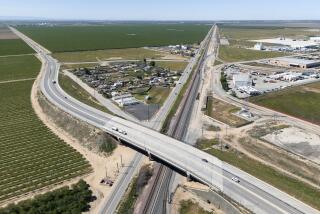Judge Calls for April Election on Charter
Handing a major victory to Los Angeles Mayor Richard J. Riordan, a federal judge ruled Thursday that the city should hold a charter reform commission election in April, and that candidates for the panel must be elected by neighborhood, not citywide.
Riordan wants to establish a commission to rewrite the city’s 71-year-old charter independent of the City Council. The council, meanwhile, has already created its own panel to study the charter and recommend changes, and has criticized Riordan’s ballot measure as a power grab.
U.S. District Judge Marianna Pfaelzer said in effect Thursday that the charter reform measure should be on the same ballot as Riordan’s bid for a second term next spring.
Meanwhile, big names from Los Angeles political history joined the raging debate on charter reform by signing the ballot arguments for both sides.
Former Mayor Tom Bradley, retired U.S. Rep. Edward R. Roybal and the local police and fire unions are siding with the City Council, while anti-tax activist Joel Fox, retired Police Chief Ed Davis and former teachers union President Helen Bernstein lined up behind the mayor.
Pfaelzer also agreed with Riordan’s group that an at-large election would violate the rights of minority voters.
It remains up to the City Council to determine exactly how commissioners will be selected, but the most likely scenario is that boundaries of the city’s 15 council districts will be used.
“It’s an important day for the people of Los Angeles. The court decided for the people and democracy, and against delay tactics advocated by politicians,” Riordan said in a telephone interview from his Idaho vacation home. “The bottom line is the City Charter now results in a dysfunctional government. We need a charter that works better.”
Riordan says he wants to rewrite the charter to increase neighborhood power. Council critics say his real motive is to give the chief executive more power at the expense of the City Council. Historically, analysts have blamed the charter’s “weak mayor” system for some of the political inertia that plagues City Hall.
*
Councilman Nate Holden, a leading opponent of Riordan’s plan for an elected commission, said it is unfair to choose commissioners this spring because candidates will have to scramble to meet filing deadlines next month. He vowed to continue fighting against having the measure on the April ballot by asking his council colleagues to appeal the judge’s ruling, forcing a delay. He said he will also ask the council to contest the city clerk’s recent certification of the petition that qualifies the measure for the ballot.
“It’s not over until it’s over,” said Holden, who attended the brief hearing Thursday in Pfaelzer’s courtroom. “By the mayor ramrodding this whole legal process through, in effect, it denies the public the right to participate. That’s what’s wrong. The mayor’s not giving the public sufficient notice.”
State Sen. Tom Hayden (D-Los Angeles), who is expected to run against Riordan in April, said the judge’s ruling enhances the mayor’s “electoral strategy” of painting himself as a candidate of reform.
“His idea of charter reform is to increase the power of the mayor at the expense of neighborhoods,” Hayden charged. “From the point of view of the citizens, the whole thing is fraught with problems. It’d be better [to put a reform measure on the ballot] in June, because people would have more time to find out what’s going on.”
Like Riordan, Hayden said he plans to endorse a slate of 15 candidates--one in each district--to fill the commission seats. The City Council is also likely to field a slate of candidates, even though it has already appointed a 21-member citizen panel that began work several weeks ago revising the governing document.
For nearly a year, Riordan and the council have been at loggerheads over what to do about the 680-page document that acts as the city’s constitution. Frustrated with the council’s plan to appoint a commission and maintain the right to edit its work before placing it before voters, the mayor spent $400,000 of his own money on a petition drive to force an elected commission whose work would go directly on the ballot without interference from other elected officials.
If voters approve such an elected commission in April, the members they elect to staff it will work for at least two years before placing the rewritten charter itself on the ballot for voter approval.
“There are a lot of very smart people out there who have some good ideas. There are ideas that we haven’t even heard of yet that I think will be very interesting to contemplate,” said David Fleming, a San Fernando Valley lawyer who helped launched Riordan’s petition drive. “We want to see homeowners on there. We want to see seniors on there. We want to see everybody that has something to add to this group.”
*
Riordan’s plan hit a snag earlier this month when the county registrar of voters refused to certify the petition based on a random sampling of signatures, which threatened to prolong the counting process beyond the deadline for the April ballot. But City Clerk J. Michael Carey on Friday certified the petition, prompting outrage from Holden and other council members.
The City Council is in recess until Jan. 3, and Judge Pfaelzer set a Jan. 7 deadline for the council to draft an election plan for April.
“We have to take these things a step at a time,” council President John Ferraro said through his spokeswoman, Gayle Johnson. “We need information from the city attorney as soon as possible . . . [to hear] what the options are and determine what our position is.”
Lawyers for the city acknowledged that an appeal is “always one of the options,” but declined to comment on how they would advise the council.
Among the outstanding questions is when candidates would have to file papers declaring their intent to run for the charter reform commission, and when they would have to return the required petitions qualifying their names for the ballot.
Candidates for other April city elections must file their statements of intent by Jan. 13, and return petitions by Feb. 3. (Candidates must have at least 500 signatures from registered voters in their districts, and can avoid a $300 filing fee by submitting 1,000 signatures). Riordan has asked the city clerk to clarify whether these deadlines would also apply for commission candidates; both the mayor and his council opponents would prefer to see the deadlines extended since specifics about how the districts will be divided will not be determined until Jan. 7, less than a week before the first deadline.
In the ballot arguments submitted Thursday, Riordan’s group--which includes Airport Commission President Dan Garcia, Valley secession leader Richard Close and UCLA law professor Susan Estrich--talks of “frustration with ineffective government, wasted taxpayer money and the lack of accountability,” and describes the current charter as a “spider web of tangled legal phrases and bureaucratic rules that need to be evaluated and reformed.”
The opposing view, signed by Ferraro, former Ethics Commission Director Ben Bycel and San Fernando Valley activist Gordon Murley as well as Bradley, calls the idea of an elected charter commission “risky” and “undemocratic” and pleads with voters to leave the revising to the City Council’s appointed commission, “a representative, independent group of highly qualified people who reflect the city’s geographic and ethnic diversity.”
“If you like the status quo, you’ll love their signatures,” said Rick Taylor, the political consultant working for Riordan’s group that is backing an elected commission. “All those people are fine people, but it’s the status quo. It’s the unions that have been taken care of by the City Council, and it’s establishment politicians. We’re more the change people. We’re the people saying: Let the voters in Los Angeles choose.”
Councilman Mike Hernandez said he was pleased with Pfaelzer’s ruling because he believes that minorities are better served by district elections and that there will be a wider turnout in April because of the mayoral and council elections.
But he said he remains concerned about Riordan’s involvement in the initiative process.
“The mayor keeps on trying to use the checkbook,” Hernandez said, a reference to the personal funds Riordan spent on the reform proposal. “The charter is about checks and balances. He keeps trying to use the checkbook to undo that.”
More to Read
Start your day right
Sign up for Essential California for news, features and recommendations from the L.A. Times and beyond in your inbox six days a week.
You may occasionally receive promotional content from the Los Angeles Times.






